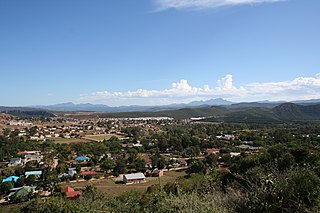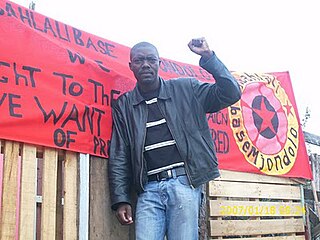
The Cape Flats is an expansive, low-lying, flat area situated to the southeast of the central business district of Cape Town. The Cape Flats is also the name of an administrative region of the City of Cape Town, which lies within the larger geographical area.

In South Africa, the terms township and location usually refer to the often underdeveloped racially segregated urban areas that, from the late 19th century until the end of apartheid, were reserved for the non-whites, namely Black Africans, Coloureds and Indians. Townships were usually built on the periphery of towns and cities. The term township also has a distinct legal meaning in South Africa's system of land title, which carries no racial connotations.

Abdurrazack "Zackie" Achmat is a South African activist and film director. He is a co-founder the Treatment Action Campaign and known worldwide for his activism on behalf of people living with HIV and AIDS in South Africa. He currently serves as board member and co-director of Ndifuna Ukwazi, an organisation which aims to build and support social justice organisations and leaders, and is the chairperson of Equal Education.

The South African Police Service (SAPS) is the national police force of the Republic of South Africa. Its 1,154 police stations in South Africa are divided according to the provincial borders, and a Provincial Commissioner is appointed in each province. The nine Provincial Commissioners report directly to the National Commissioner. The head office is in the Wachthuis Building in Pretoria.

Masiphumelele is a township on the Cape Peninsula, South Africa, situated between Kommetjie, Capri Village and Noordhoek.

Khayelitsha is a township in Western Cape, South Africa, on the Cape Flats in the City of Cape Town Metropolitan Municipality. The name is Xhosa for New Home. It is reputed to be one of the largest and fastest-growing townships in South Africa.

Mitchells Plain is a large township located within the City of Cape Town, Western Cape, South Africa and situated about 28 km (17 mi) from the Cape Town city centre. It is one of South Africa's largest residential areas and contains multiple smaller suburbs. It is located on the Cape Flats on the False Bay coast between Muizenberg and Khayelitsha. Conceived of as a "model suburb" by the apartheid government, it was built during the 1970s to provide housing for Coloured victims of forced removal due to the implementation of the Group Areas Act.
South Africa has a long history of alternative media. During the 1980s there was a host of community and grassroots newspapers that supplied content that ran counter to the prevailing attitudes of the times. In addition, a thriving small press and underground press carried voices that would not have been heard in the mainstream, corporate media. Pirate radio projects operated by Caset were the forerunners of the country's community radio and small pamphlets and samizdat were included in the mix.

Crossroads is a high-density township in the Western Cape, South Africa.

Water supply and sanitation in South Africa is characterised by both achievements and challenges. After the end of Apartheid South Africa's newly elected government struggled with the then growing service and backlogs with respect to access to water supply and sanitation developed. The government thus made a strong commitment to high service standards and to high levels of investment subsidies to achieve those standards. Since then, the country has made some progress with regard to improving access to water supply: It reached universal access to an improved water source in urban areas, and in rural areas the share of those with access increased from 66% to 79% from 1990 to 2010.

The Western Cape Anti-Eviction Campaign was a non-racial popular movement made up of poor and oppressed communities in Cape Town, South Africa. It was formed in November 2000 with the aim of fighting evictions, water cut-offs and poor health services, obtaining free electricity, securing decent housing, and opposing police brutality.
Irene Grootboom was a South African housing rights activist best known for her victory before the Constitutional Court in 2000. The Court found that the government had not met its obligation to provide adequate alternative housing for the residents of Cape Town's Wallacedene informal settlement. The ruling provided clear legal support for housing-rights campaigns in South Africa and elsewhere. At the time of her death in August 2008, however, Grootboom was still living in a shack.

Delft is a township on the outskirts of Cape Town, South Africa. It is situated next to the Cape Town International Airport, Belhar, Blue Downs, Ikwezi Park, Mandalay, Luzuko, Phillipi East, and Site C, Khayelitsha. It is known for its recreational events, youth empowerment organizations such as Enkosi Foundation and the community has establish a motherbody organisation, the Delft Community Development Forum. Delft is a community that consists of numerous government built housing projects such as the N2 Gateway. In 2022 Delft was the fastest growing community in Cape Town.

Mzonke Poni is an activist in Cape Town. He is the former chairperson of Abahlali baseMjondolo of the Western Cape and was previously a leader of the Western Cape Anti-Eviction Campaign. The Sunday Times has described him as "the face of an ANC nightmare - an angry activist mobilising the township masses to protest at what he calls the government's failure to create a better life for the poor."
South Africa has been dubbed "the protest capital of the world", with one of the highest rates of public protests in the world.

Equal Education (EE) is a member-based, mass democratic movement of learners, post-school youth, parents and community members striving for quality and equality in South African education system through activism and research. Equal Education builds understanding of the education system, while drawing attention to problems faced by schools and their communities. EE offers a new way to participate in the democratic system and bring change to education and society.
QQ Section also known as Tambo Park, was founded in 1989 and is an Informal Settlement in the Site B sub-division of Khayelitsha in South Africa.

The Khayelitsha Commission, also known as the O'Regan/Pikoli Commission, was a commission of inquiry appointed by Premier of the Western Cape Helen Zille to investigate allegations of police inefficiency in Khayelitsha and the breakdown in relations between the Khayelitsha community and the police. The commissioners are former Constitutional Court Justice Kate O'Regan and former National Director of Public Prosecutions Vusi Pikoli.
The Ndifuna Ukwazi (NU), translated from isiXhosa: Dare to Know, is a South African non-profit advocacy organisation established in 2011 to advocate for affordable housing in well-located urban spaces. The organisation does this by conducting policy research, community organisation, public advocacy, litigation, and the provision of legal services. Most of the organisation's activities focus on communities within the City of Cape Town.
Reclaim The City (RTC) is a non-racial social movement fighting for land and housing in Cape Town's inner-city and wealthy suburbs. Reclaim The City is known for its campaigns for affordable and low-income housing as well as spearheading the occupation of two empty and dilapidated government buildings which it turned into housing for poor and vulnerable families.















